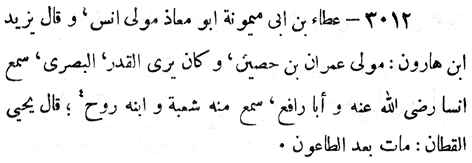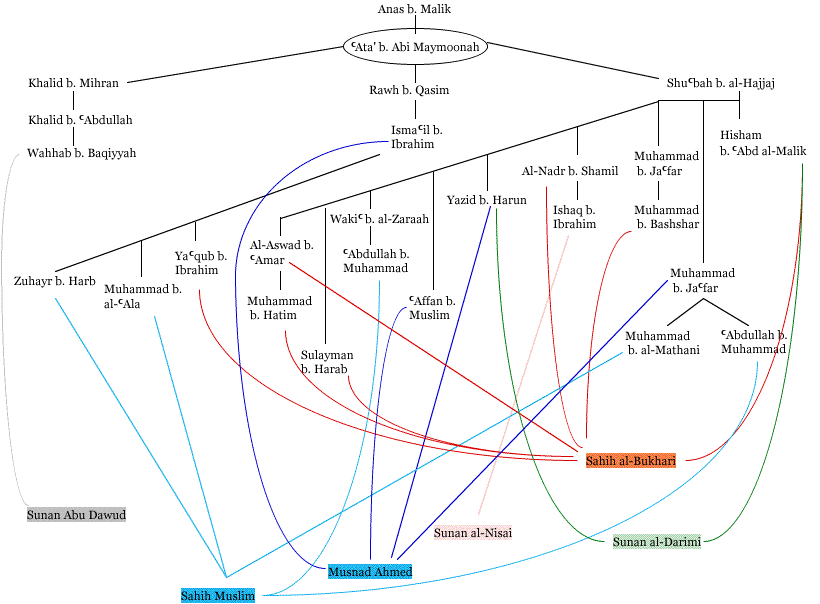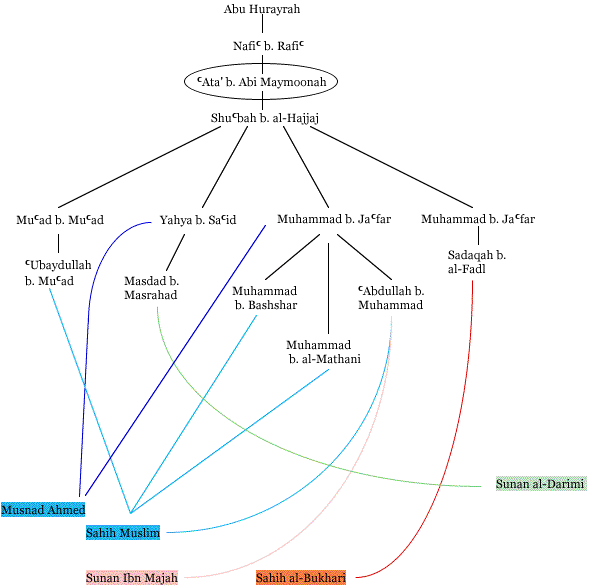![]()
Islamic Awareness
© Islamic Awareness, All Rights Reserved.
First Created: 18th August 2000
Last Modified: 7th September 2003
The first person on the list is:
It is interesting to note that Bukhari wrote a book about the narrators (Zuafa-us-sagher). What is even more interesting is that Bukhari's book condemns several narrators including: ... Ata bin abi Maimoona ... as unreliable. However, the Hadith-collection of Bukhari in the its modern form actually includes many traditions narrated by these very individuals! Obviously, these traditions, which Bukhari rejected, were inserted in his book following his death.
a narrator called "Ata bin abi Maimoona".
1. Did Al-Bukhari Say `Ata B. Abi Maimoona "Unreliable"?`Ata' b. Abi Maymunah is in Kitab al-Du`afa al-Saghir. Al-Bukhari says:

277 - `Ata' Ibn Abi Maymunah, Abu Mu`adh, he is the freed slave of Anas. Yazid Ibn Harun said he is the freed slave of `Imran Ibn Husayn. He opined in predestination [i.e., he was a qadari]. He was from Basrah and heard from Anas Ibn Malik and Abu Rafi`. Narrated from him Shu`bah and his son Rawh. Yahya said: He died after the plague.[1]
In the footnotes by the editor of Kitab al-Du`afa al-Saghir we read:

277 - He reported from `Imran Ibn Husayn. These reports are in Sunan Abu Dawud but are disrupted [Arabic: munqati`ah] as he did not meet him. He also reported from Jabir Ibn Samrah. Ibn Ma`in deemed him trustworthy [thiqah] and said: He and his son are qadari. Abu Hatim said: He does not count as evidence. Abu Ishaq al-Jawzajani said: He was a head of the qadaris. Al-Dhahabi objected to that saying: Nay but a small qadari and his hadith is in the two sahihs [refer to al-Mizan 76/3 and al-Kabir 469/6].[2]
Al-Bukhari says in his Kitab al-Tarikh al-Kabir says very similar to what we have read in Kitab al-Du`afa.

3012 - `Ata' Ibn Abi Maymunah, Abu Mu`adh, he is the freed slave of Anas. Yazid Ibn Harun said he is the freed slave of `Imran Ibn Husayn. He opined in predestination [i.e., he was a qadari]. He was from Basrah and heard from Anas Ibn Malik and Abu Rafi`. Narrated from him Shu`bah and his son Rawh. Yahya al-Qattan said: He died after the plague.[3]
Ibn Hajar in his Taqrib al-Tahdhib said concerning `Ata':

200 - `Ata' Ibn Abi Maymunah, Abu Mu`adh. The name of Abu Maymunah is Mani`. He is trustworthy [Arabic: thiqah] and was accused of being a qadari...[4]
Al-`Ijli said that `Ata' is:
thiqah....[5]
To start with, al-Bukhari says that he is accused of being a Qadari. `Ata' is neither condemn as "unreliable" and nor it is said that his traditions "rejected" by al-Bukhari. Rather, the hadith specialists agree that `Ata' is reliable. This is precisely opposite of the claim made by the missionaries! Furthermore, the editor of al-`Ijli's book Tarikh al-Thiqat actually states that there is a complete agreement that `Ata' Ibn Abi Maymunah is trustworthy and precise. This lends further support to the fact that al-Bukhari did not include him in Kitab al-Du`afa because he was a weak narrator but he only included him due to the fact that he was a Qadari.
2. Traditions Of `Ata' B. Abi Maymunah In The Sahih Of Al-BukhariThere are two hadiths narrated by `Ata' Ibn Abi Maymunah in the Sahih of al-Bukhari.
One of them describes how Anas Ibn Malik would take water for the Prophet(P) after he had answered a call of nature. Muslim, Abu Dawud, al-Nasa'i, al-Darimi and Ahmed also reported the same hadith from Anas bin Malik through `Ata' Ibn Abi Maymunah, in some cases with slightly different wordings. The hadith is as follows:
Whenever Allah's Apostle went to answer the call of nature, I along with another boy used to accompany him with a tumbler full of water. [Kitab al-Wudu, No. 146]
The isnad bundle is shown in the figure below.

Notice the shorter isnad of the hadith recorded in Musnad Ahmed and Sunan of al-Darimi, the reason for which would be clearer as we further the argument.
The other hadith narrated by `Ata'. The hadith reads:
Zainab's original name was "Barrah," but it was said' "By that she is giving herself the prestige of piety." So the Prophet changed her name to Zainab. [Kitab al-Adab, No. 5724].
The isnad bundle of this hadith is shown below.

The hadith has been collected by Ahmed with shorter isnads than al-Bukhari.
The claim of the missionaries is that the name of `Ata' Ibn Abi Maymunah was considered as an "unreliable" and "weak" narrator and was inserted into the isnad after the death of al-Bukhari (d. 256 H). If this is the case then why did Ahmed ibn Hanbal (d. 241 H) and al-Darimi (d. 255 H) who died before al-Bukhari include `Ata' in the isnad? Or Muslim (d. 261 H), Abu Dawud (d. 275 H) and al-Nasa'i (d. 303 H) who died after al-Bukhari include `Ata' in the isnad? This essentially means the hadith scholars before and after al-Bukhari (as well as al-Bukhari!) considered `Ata' Ibn Abi Maymunah to be a reliable narrator, just as what we have seen before. The clear-cut case is that it is the claim of missionaries concerning the alleged insertion of `Ata' can be considered "unreliable" and stands refuted.
[1] Muhammad Ibn Isma`il al-Bukhari, Kitab al-Du`afa al-Saghir, 1976 (1396 H), Dar al-Wa`y, p. 89.
[2] ibid.
[3] Muhammad Ibn Isma`il al-Bukhari, Kitab al-Tarikh al-Kabir, 1986, Volume VI, Mu'assasat al-Kutub al-Thaqafiyah: Beirut (Lebanon), p. 469.
[4] Ahmed Ibn `Ali Ibn Hajar al-`Asqalani, Taqrib al-Tahdhib, Volume II, 1960, Al-Maktabat al-`Ilmiyyah: Al-Madinah, p. 23.
[5] Ahmed Ibn `Abdullah Ibn Salih Abu al-Hassan al-`Ijli, Tarikh al-Thiqat, 1984 Edition, Dar al-Kutub al-`Ilmiyyah: Beirut (Lebanon), No. 1133.